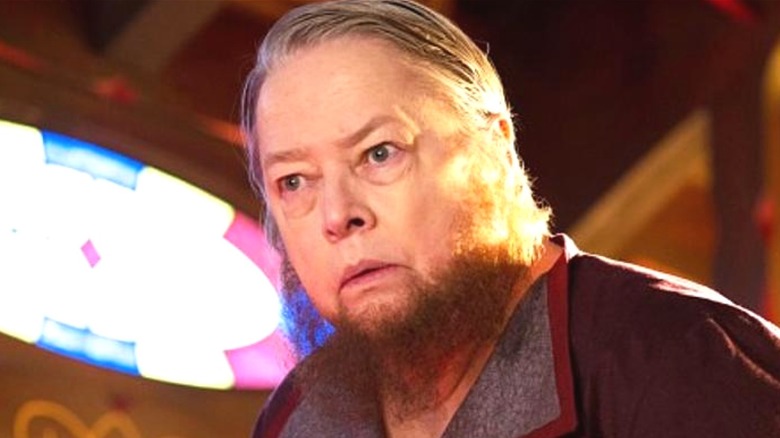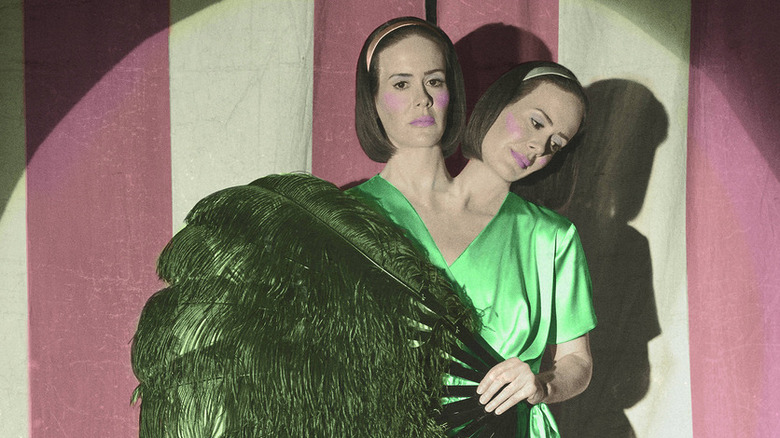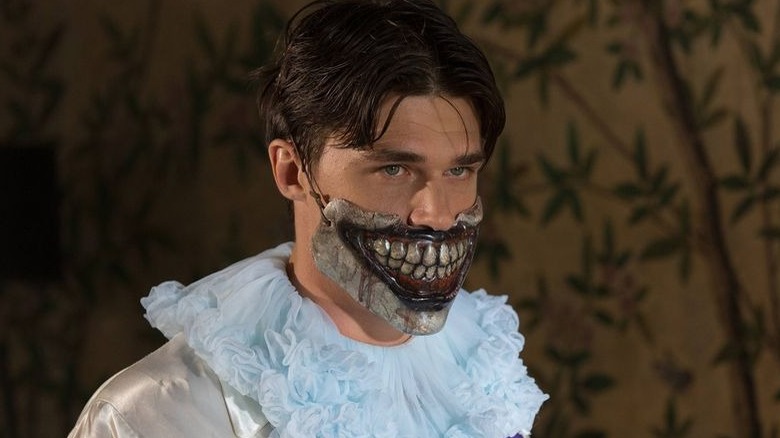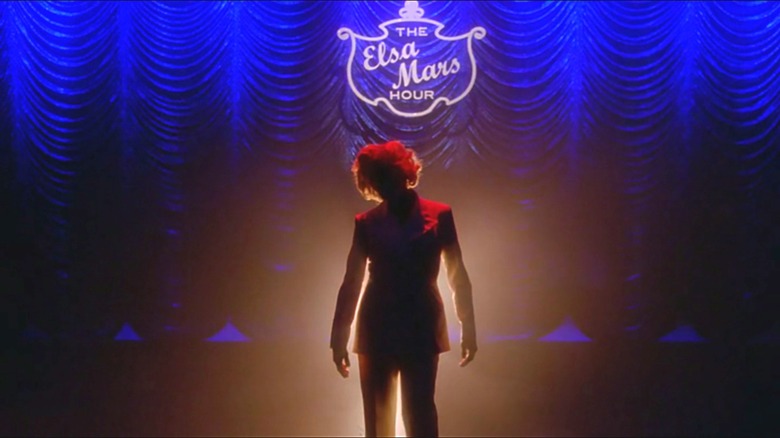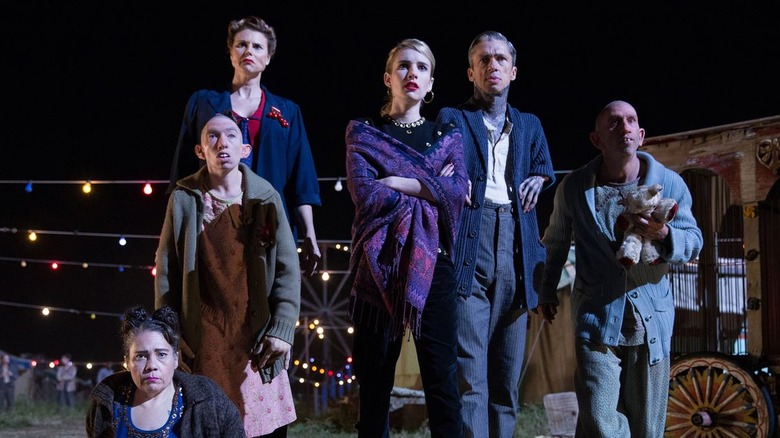The Ending Of American Horror Story Season 4 Explained
If "American Horror Story: Asylum" gave audiences a glimpse of the series' (and creator Ryan Murphy's) thematic through-line, "AHS: Freak Show" beat them over the head with one of those giant carnival mallets used to test one's strength.
In what Time writer James Poniewozik called "the Ryan Murphiest" of any "AHS" season, the writer-director took his usual "Who's the real monster here?" subtext to ever more obvious and literal heights; in "Freak Show," the outcasts are literally "freaks." But Murphy doesn't stop there when it comes to molding his ethos into something tangible: Conjoined twins Dot and Bette Tattler (Sarah Paulson) act as a manifestation of another of the series' favorite themes, that of the dichotomous and (literally) inseparable nature of hope and despair, fear and attraction, love and hate, repulsion and fascination, shame and pride.
But for every thesis "Freak Show" blatantly delivers, it asks of its audience a much subtler follow-up question. And nowhere are these questions more pronounced than in the aesthetically splashy season's concluding episodes.
You can't have one without the other
In the season finale of "Freak Show," audiences get to observe some semblance of a happy ending for fan-favorites Dot and Bette, Jimmy Darling (Evan Peters), and Desiree Dupree (Angela Bassett). It's an ending that comes at a cost, though, and one that gives viewers an even greater sense of relief for the perpetually tragic foursome.
Just as one couldn't appreciate the necessity of Dot's cynicism and suspicion without being treated to Bette's naiveté and starry-eyed innocence, the notion of Desiree finding such perfect love and acceptance or Jimmy and Dot finally coming together in wedded bliss would ring a bit hollow without the devastation leading up to this hard-won happily-ever-after.
More importantly, as in every season of "AHS," nobody gets to ride off into the sunset without a little blood on their hands. All four characters slip briefly into a moral gray area (where Ryan Murphy loves to let his characters linger) when they exact their deadly, dramatic revenge on mass-murdering millionaire Dandy Mott (Finn Wittrock).
In his final interaction with Dandy, Jimmy Darling delivers what could well be called Season 4's credo: "The freaks," he says, "shall inherit the Earth." It's no accident that his speech culminates in a riff on one of the Bible's most repeated lines. Throughout the season, we see the supposedly good, God-fearing townspeople of Jupiter, Florida, turn their backs on the show's performers, whom they see at best as "other" and at worst as "evil." The scene leans heavily into one of Murphy's most called-upon themes — that of the hypocrisy of a society that simultaneously passes judgment on anyone it doesn't understand while claiming to be good and pious.
We are the people Ryan Murphy warned us about
While Finn Wittrock created an unforgettable "AHS" villain in his portrayal of the entitled, narcissistic, and psychopathic Dandy Mott, it's not so much his murderous tendencies from which Murphy expects viewers to recoil in fear but the mind and motives that drive them.
Dandy is all about "ownership." He doesn't interact with, experience, share, or understand things; he simply possesses them. His massacre of the freak show cast is his direct response to Paul (Mat Fraser) telling him he doesn't own them. When Bette shoots him across his sprawling dinner table, his immediate reaction isn't one of fear or pain, but of affront: "That's mine!" he says of the gun in her hand.
And yet what disgusts us most about Dandy isn't his over-the-top indignation and entitlement but how he serves as a funhouse mirror of our own capitalist society. When Jimmy not-so-gently explains to Dandy, "You're going die," he does so while facing the television audience. It isn't Dandy's response to this reality that we're asked to explore but our own. Death comes for us all, no matter how hard we try to stave it off with the accumulation of possessions, experiences, retweets, and Instagram likes, which brings us to one of the most important takeaways from the ending of "AHS: Freak Show."
It's no secret — nor is it meant to be — that "Freak Show" has a thing or two to say (or attempt to say) about the idea of acceptance. Whether it's accepting someone's or one's own past, sexuality, outward appearance, or personality flaws, Season 4 makes it pretty clear that understanding and embracing these things is a darn good way to live if you want to avoid being the main instrument of your own unhappiness.
The finale, however, takes the importance of this specific brand of approval one step further, with the conclusion of Elsa Mars' (Jessica Lange) alternately heartbreaking and uplifting narrative.
Could it really be that simple?
After narrowly escaping being avenged by the people she claimed to love the most (her "freaks"), Elsa manages to run away to Hollywood, marry a casting director, and, in a short time, achieve superstardom with her very own network TV show, "The Elsa Mars Hour." But all that glitters isn't gold in Elsa's fairy tale: She's trapped in a loveless, unhappy marriage, forced to perform in a show and for an audience that brings her no satisfaction, and, worst of all, when she's finally reunited with the one man she ever truly loved, she finds out he has terminal cancer and just one month to live.
Elsa realizes too late that what she thought she wanted wasn't what she wanted at all. As she laments to her dying lover that she feels "cursed" by having all her dreams come true, Elsa shares a birthday wish she made eight years prior, over a cake made by Ethel Darling (Kathy Bates), the "best friend" she ultimately murdered.
"My wish was plain and simple," she says: "I just wanted to be loved." It's an emotionally gutting realization for the chanteuse and no less gutting for the viewer, who understands now that Elsa's wish — and the finale's ultimate statement — are one and the same, and surprisingly simple. Elsa was lucky enough to find both love and acceptance but was too blinded by the undeniable human impulse for bigger, flashier, and more apparent forms of it to appreciate what she had.
Thus, after being reminded of our own imminent mortality, base consumerism, and toxic ignorance and biases, we're treated to the truly horrifying realization that, as a species, we're just not very good at seeking out, appreciating, and holding on to the things that actually give life meaning. Still, there's a flicker of Bette Tattler-esque hope in "AHS" Season 4's finale.
Strength in numbers
Although "Curtain Call" isn't as explicit in its delivery of this important theme as it is with some others, it does repeatedly let the audience in on a little secret: Going solo will never bring us the kind of acceptance we find in family. Whether that family is the one into which we're born or the one we find and assemble ourselves, it's in these familial and unconditional bonds alone that true acceptance lives.
Acceptance isn't, the finale reiterates, pity, sympathy, or fascination. Dandy may have convinced himself he feels love for Bette, but Desiree points out that his obsession with her comes from somewhere else entirely. "That's where you think freaks belong," she says, "powerless, behind glass, a human car crash to stare at and remind you how lucky you are."
Nor is acceptance found in praise, reverence, or a massive fan following. None of these various forms of adoration brought Elsa the one thing she craved most in life. For Elsa, it's only in death that she finds acceptance because it reunites her with her fellow freaks. When she arrives, rather than being made to pay for her sins, she's greeted casually by Legless Suzi (Rose Siggins) and Paul, and when she's surprised that Ethel wants her to perform, her best friend is pragmatic. "You're a terrible friend, a pain in the a** boss, and you can't cook for sh*t," she reminds her. Family may not forget our mistakes, but they do forgive us.
Ultimately, although Season 4 of "AHS" covers some familiar Ryan Murphy terrain in terms of who the true freaks/monsters are, it concludes on an uncharacteristically simple and even hopeful high note. Maybe we are all obsessed with the wrong things, and maybe we can't help but be so, but if we're lucky enough to not only receive but also give, value, and appreciate acceptance and unconditional love, we, too, "could be heroes."
